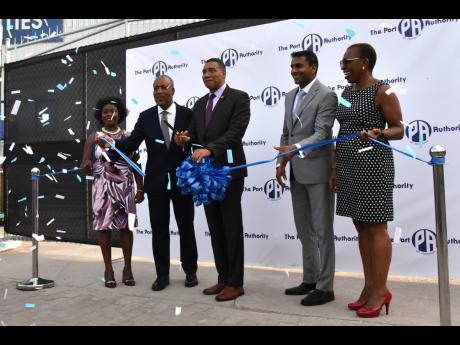Clive Coke | Custom brokers set to capitalise on burgeoning logistics economy
Jamaica’s Customs Brokers gathering in Kingston for their 56th Annual General Meeting in July, amid a persistent global supply chain crisis in a COVID-19 pandemic that threatened to shut down businesses, have been switched on for some time to the economic and business potential of positioning the island as a global destination for cargo transshipment and logistics services.
Brokers have been preparing and planning for the day when the plethora of policy-speak and public pronouncements on Jamaica becoming a ‘Global Logistics Hub’ would materialise into some tangible greenfield investment.
The opening of the Kingston Logistics Park in July 2022, an 18,000-square-metre modern warehouse facility located adjacent to the Kingston Freeport Terminal, which serves 12 major shipping lines, gives that impetus.
The Kingston Logistics Park is aimed at capitalising on our advantageous proximity to the big consumer markets of North and South America to incubate inward wealth-creating investments that will spur economic growth and create jobs for Jamaicans.
Managing the agile movement of goods in the Park in compliance with customs and border requirements is an essential input in the operations of the Kingston Logistics Park, which by necessity, includes a border-protection centre housing the Jamaica Customs Agency and the Container Security Initiative in collaboration with the United States Government.
As the foremost professional body of licensed customs brokers, freight forwarders, logisticians, and professionals engaged in customs clearance and third-party logistics processes in and out of Jamaica, the over 200 member companies of the Customs Brokers and Freight Forwarders Association of Jamaica, are bringing their professional know-how and experience to ensure that the Kingston Logistics Park prospers, catalysing the creation of more Special Economic Zones (SEZs) and specialised industrial parks as we have witnessed in neighbouring Panama.
PANAMANIAN EXPERIENCE
The three largest SEZs in Panama are the Colón Free Zone, Panama-Pacific, and the City of Knowledge.
The Colón Free Zone was created in 1948 as an import/re-export zone and today is the second largest SEZ in the world after Hong Kong, employing some 30,000 workers with net exports, accounting for four per cent of Panama’s GDP according to a series of studies conducted by the Center for International Development and the President and Fellows of Harvard College.
The Panama-Pacific (PP) SEZ, which started operations in 2007, was created as an industrial and residential park with a battery of tax and migratory incentives for firms. Nowadays, the PP SEZ hosts over one hundred firms, 40 per cent of which are foreign entities. Multinational companies such as 3M, Dell, and Caterpillar have already relocated part of their regional operations to Panama.
The City of Knowledge SEZ, which was a former military base close to the Canal, is now a technology park hosting an array of medium/small technology firms, and the United Nations Development Program regional headquarters.
Even with the constraints caused by the COVID global pandemic and the massive dislocations in the global supply chain, the Panamanian Government approved five new trade zones in February 2020, focusing on agro-industrial production, for processing and manufacturing, merchandise storage and logistics services, biomass processing, and urban waste management to generate energy.
What Panama has done is possible for Jamaica and the rest of the Caribbean region to replicate.
We must collectively pay attention to what is happening in the Expanded Canal inaugurated on June 26, 2016, which is facilitating increased traffic flow. The performance indicators in environmental leadership are also above par. Container ships represent more than half of the traffic that passes through the Expanded Canal, followed by liquefied petroleum gas carriers and liquefied natural gas (LNG) carriers.
More than 90 per cent of the LNG world’s fleet can now transit the Panama Canal, which opened the doors to a new market and allows LNG producers in the United States to send natural gas to Asia at competitive prices.
BUILDING CAPACITY
Emerging from the vicissitudes of the COVID-19 pandemic, Jamaican Customs Brokers are far more resilient from the lessons learnt and are bullish about the prospects of a global logistics industry, which is projected to be worth approximately US$12.9 billion in 2027.
When considered against the over US$1 billion investments made in recent years to improve Jamaica’s transportation and logistics infrastructure, such as the completion of the North-South Highway and the current work on the southern coastal highway to improve efficiency of the local supply chain, there will also be greater demand for more sophisticated service offerings from Jamaica’s customs brokers.
In response, customs brokers have been expanding their businesses, making significant investments in internal capacity-building in logistics and supply chain management, e-commerce, haulage logistics, IT infrastructure development, data analytics, and the focused training and development of their people assets to capitalise on the opportunities as they arise in the business environment.
As Jamaica seeks to position itself as a globally competitive economy, logistics will be a vector industry driving sustainability, competitiveness, efficiency, and performance.
Customs brokers, in partnership with the Jamaica Customs Agency, are equipped to provide the required customs and logistics services for the investors in the Kingston Logistics Park, and other logistics investments that are on the anvil, to make trade happen efficiently and within the boundaries of new and progressive Customs laws.
Through collaboration and focused action, Jamaica’s rankings in the global Logistics Performance Index will improve and the GDP growth and employment will come.
The opportunities are here. We must be ready to take advantage of them to succeed.
Clive Coke is a licensed customs broker and president of the Customs Brokers and Freight Forwarders Association of Jamaica, the largest professional body of its kind in the English-speaking Caribbean. Send feedback to clive.coke@worldelogistics.com


